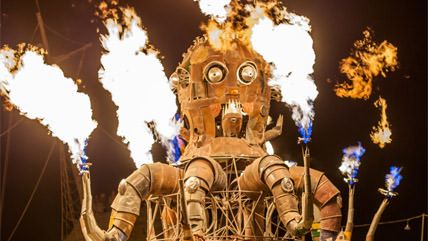School Sucks! 'Maker Culture' Is Literally Making Learning Better
Making a giant octopus is way more enlightening than taking the SAT or Sociology 101.

Perched in a watchtower above a live-sized game of Mouse Trap, MythBusters host Adam Savage announced, "When you make something … you're telling a story about your desires. … You're using your tools to improve yourself and the world around you." He was directing the point to the younger attendees in his crowd of hundreds at Maker Faire in San Mateo, California, this past weekend. Their stories and desires are varied, but there was a consistent theme among many makers: They want to make life and learning more liberated, more fun, and a bit more rugged.
Implicit in their optimism and aim toward improvement is the awareness that current circumstances kind of suck. Young people cranked through America's school system know that too well. The first generation exposed en masse to zero tolerance policies, millennials have been expelled, arrested, and tasered for an absurd litany of inoffensive acts. That's on top of schools' perennial failure to actually provide kids with a decent education. This generation is growing up and going to college in record numbers, only to find institutions drained of their counterculture gusto for intellectual confrontation and replaced by free speech zones that quarantine unpalatable ideas.
Growing up alongside millennials is the maker movement, and it is flourishing. Many young adults would do well to look upon this year's Maker Faire's standout structure: an imposing, steampunk octopus perched on a Mad Max-esque car. The razor-jawed, trash can-paneled beast is awesome in its ability to push people out of any sense of normalcy. It belches flames out of its tentacles as though it were a gritty reboot of the Statue of Liberty illuminating the eclectic, rough-around-the-edges movement of makers, whose do-it-yourself constituency overlaps everyone from hackers to knitters to off-the-gridders. They, like Savage, embrace hands-on education that "recognizes that discouragement and failure is part of the project."
"In the maker community, you won't often find people who say, 'You can't do that,'" explains Lucy Beard, founder of 3D-printed shoe business Feetz. But that's not to say makers are soft on each other. She comes to the fair to hear, "I don't think you're doing it right. You could do it like this." In this way, her peers act like a massive, decentralized workshop course better than the current college environment, whereas the class of 2014, instilled with a sense of fragility, calls for the censorship of ugly art, pleads for "trigger warnings" so they can avoid canonical literature's fictitious violence, and petitions against commencement speakers whose ideologies differ from their inchoate own. Beard and other makers, by contrast, seek out the exchange of criticism because it "is how we all grow."
Of course, some of that growth happens best at the individual level. Ryo Chijiiwa, creator of solar panel startup BootstrapSolar, credits the experiences he gained living off the grid for his readiness to confront new challenges. "I'm trained as a software engineer, I didn't know anything about solar," he says. Having his cabin's solar panels fail in the woods "forced me to solve problems, but it also empowered" Chijiiwa and provoked him to design easily repairable panels useful for people in disaster situations.
Some have even created a whole curriculum out of this kind of rugged attitude.
"We don't tell kids to be careful. We tell them to pay attention. That's one of our first and most important values," says Jess Liotta, the regional director of wilderness education organization Trackers Earth, which teaches people how to make a range of tools and weapons. Put differently by an 8-year-old Tracker, the organization aims to teach people "how to do dangerous things safely"—a mission that would probably cause fainting spells among school administrators who suspend pocket-knife-carrying kids.
Liotta recognizes that few students will ever end up in a survival situation; they're as much in the business of building kayaks as building characters. Rather, says Liotta, they want students to exercise their "creativity and independence to work together and survive and thrive in the urban environment they live in."
The maker movement is literally making alternatives to the one-size-fits-all education we're used to. Whether one opts in to butcher a rabbit for dinner with her primitive knife, repair her energy source because there's no one else around, or risk burns by a soldering iron to assemble her first robot at Maker Faire, the visceral opportunities to succeed (or fail) almost certainly teaches an individual more about herself and her abilities than any standardized test or mandatory general education course ever could.


Show Comments (91)